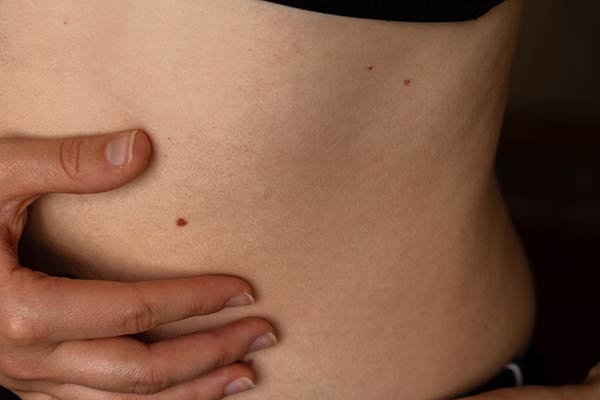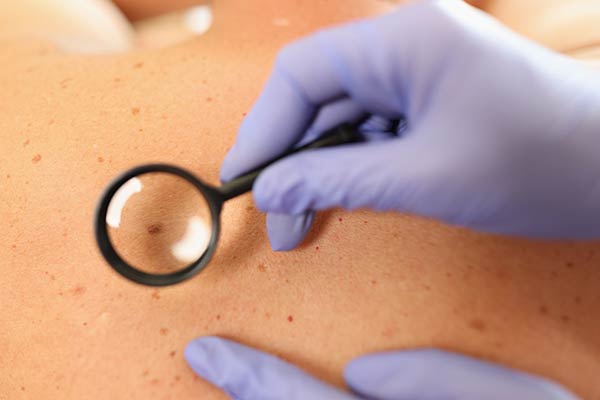Skin Check
Every year, skin cancers account for about 80% of newly diagnosed cancers in Australia. In fact, almost two in three Australians will be diagnosed with skin cancer by the age of 70. Early detection is key in ensuring adequate treatment is provided to patients.
The sooner a skin cancer is identified and treated, the better your chance of avoiding surgery or, in the case of a serious melanoma or other skin cancer, potential disfigurement or even death.
Most important thing in skin check is that the Doctor’s eyes to be familiar with normal and abnormal skin lesions which comes with training and experience.
Dr Amir has certificate in skin check and dermoscopy from Australian college of Skin cancer. he has been performing skin checks for more than 10 years in his daily practice which has resulted in detection of hundreds of skin cancer at early stages.
The good news is most of skin cancer can be curable if detected and managed early.

Skin Check
Every year, skin cancers account for about 80% of newly diagnosed cancers in Australia … in fact almost two in three Australians will be diagnosed with skin cancer by the age of 70. Early detection is key in ensuring adequate treatment is provided to patients.

The sooner a skin cancer is identified and treated, the better your chance of avoiding surgery or, in the case of a serious melanoma or other skin cancer, potential disfigurement or even death.
Most important thing in skin check is that the Doctor’s eyes to be familiar with normal and abnormal skin lesions which comes with training and experience.
Dr Amir has certificate in skin check and dermoscopy from Australian college of Skin cancer. he has been performing skin checks for more than 10 years in his daily practice which has resulted in detection of hundreds of skin cancer at early stages.
The good news is most of skin cancer can be curable if detected and managed early.

Skin lesion removal
If after your skin check Dr Amir find out abnormal and suspicious lesion, he will talk to you about removing the lesion. He does most of the skin surgeries himself but if he thinks second opinion is needed, he refers you accordingly.
Your skin lesion will be removed with recommended safe margin and will be sent to a laboratory for histological study.
Frequently asked questions
What causes skin cancer?
More than 95% of skin cancers are directly related to exposure to UV radiation. UV radiation most often comes from the sun, but it can also come from artificial sources such as solariums.
When your unprotected skin is exposed to the sun or other UV radiation, the structure and behaviour of your skin cells can change. This can permanently damage the skin, and this damage adds up over time.
The good news is it is never too late to start protecting your skin! The best way to avoid skin cancer is by regularly protecting your skin from UV. Every day you protect your skin, you reduce your risk.
How to check your skin?
While protecting your skin from UV radiation is the best defence against skin cancer, it is also important to regularly check your skin for new or changed spots. About 95% of skin cancers are treatable if found early. Melanoma is the most serious form of skin cancer, and most melanomas are found by the person with the melanoma or their partner.
In a room with good light, undress completely and use a full-length mirror to check your whole body. You can use a handheld mirror to check areas that are difficult to see, or you can ask someone to help you.
Make sure you check your whole body, not just the areas exposed to the sun, including hard-to-see areas like your back, scalp and back of your neck.
If you notice a new spot or one that has changed, consult your doctor.
Who is at higher risk for skin cancer?
All Australians are at risk of skin cancer due to the high levels of UV radiation we experience. However, some Australians have a higher risk, including people who have:
- had a previous skin cancer, including melanoma
- a family history of skin cancer
- fair or freckled skin, especially those with skin that burns easily
- red or fair hair and light-coloured eyes (blue or green)
- lots of moles on their body
- worked or currently work outdoors
- had short, intense periods of exposure to UV radiation
- actively tanned or used solariums
- a weakened immune system
- certain skin conditions, including sunspots.
How often should I do skin check with my doctor?
Currently, there is no set guideline for how often you should get your skin checked. Cancer Council recommends that you regularly monitor your own skin and visit a doctor if you notice any changed or new suspicious spot.
People at higher risk of skin cancer should discuss a plan of how often they should check their skin with their doctor. A full skin examination, supported with photography and dermoscopy, may be necessary every six months.
Dr Faham recommends for most of Australian to get their full skin checked once a year.
How should I book for skin check?
Please call our receptionist to arrange for full body skin check. It takes about 20 minutes to do full body check.
Dr Amir uses dermoscopy device to check lesions and will take photos of the suspicious ones. Your photos will be saved in the specific skin check software system for the follow up use.
If any lesion needs specific treatment Dr Faham will let you know and will arrange for treatment either himself or by referring to dermatologist or plastic surgeon.
How the skin surgery is done?
If Dr Amir suggest to do skin biopsy or skin lesion removal, he will let you know if he can do it himself or you need a referral.
He does skin surgery in his practice. It is a day surgery and normally you do not need to have time off work.
Please Allow up to 30 minutes for your surgery.
The area of the surgery will be numbed by numbing injection. Then Dr Amir will remove the lesion by recommended safety margin. Afterwards the skin will be closed by proper suture.
Skin lesion will always be sent to the Laboratory for histological study.
Is there any risk for skin surgery?
As you are aware all surgeries have their own risks.
Risk of minimal skin surgeries include: skin infection, scar tissue and bleeding.
These risks are minimised by following hygiene protocol, using fine suture material and appropriate follow up plan.
After the surgery Dr Amir let you know about wound care and when you need to book your follow up appointment.
